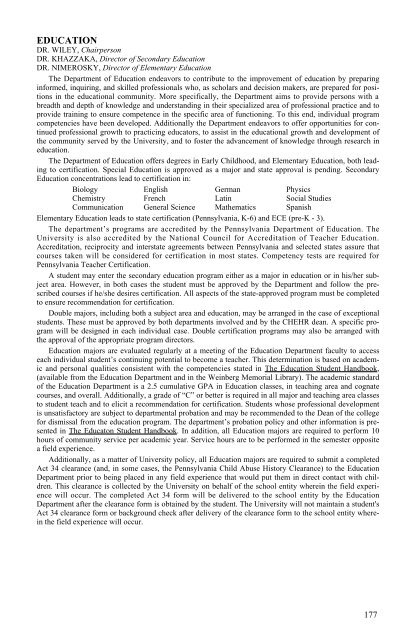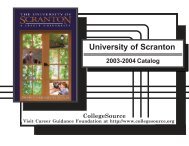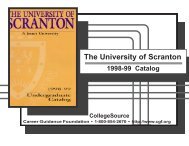Create successful ePaper yourself
Turn your PDF publications into a flip-book with our unique Google optimized e-Paper software.
EDUCATION<br />
DR. WILEY, Chairperson<br />
DR. KHAZZAKA, Director <strong>of</strong> Secondary Education<br />
DR. NIMEROSKY, Director <strong>of</strong> Elementary Education<br />
<strong>The</strong> Department <strong>of</strong> Education endeavors to contribute to the improvement <strong>of</strong> education by preparing<br />
informed, inquiring, and skilled pr<strong>of</strong>essionals who, as scholars and decision makers, are prepared for positions<br />
in the educational community. More specifically, the Department aims to provide persons with a<br />
breadth and depth <strong>of</strong> knowledge and understanding in their specialized area <strong>of</strong> pr<strong>of</strong>essional practice and to<br />
provide training to ensure competence in the specific area <strong>of</strong> functioning. To this end, individual program<br />
competencies have been developed. Additionally the Department endeavors to <strong>of</strong>fer opportunities for continued<br />
pr<strong>of</strong>essional growth to practicing educators, to assist in the educational growth and development <strong>of</strong><br />
the community served by the <strong>University</strong>, and to foster the advancement <strong>of</strong> knowledge through research in<br />
education.<br />
<strong>The</strong> Department <strong>of</strong> Education <strong>of</strong>fers degrees in Early Childhood, and Elementary Education, both leading<br />
to certification. Special Education is approved as a major and state approval is pending. Secondary<br />
Education concentrations lead to certification in:<br />
Biology English German Physics<br />
Chemistry French Latin Social Studies<br />
Communication General Science Mathematics Spanish<br />
Elementary Education leads to state certification (Pennsylvania, K-6) and ECE (pre-K - 3).<br />
<strong>The</strong> department’s programs are accredited by the Pennsylvania Department <strong>of</strong> Education. <strong>The</strong><br />
<strong>University</strong> is also accredited by the National Council for Accreditation <strong>of</strong> Teacher Education.<br />
Accreditation, reciprocity and interstate agreements between Pennsylvania and selected states assure that<br />
courses taken will be considered for certification in most states. Competency tests are required for<br />
Pennsylvania Teacher Certification.<br />
A student may enter the secondary education program either as a major in education or in his/her subject<br />
area. However, in both cases the student must be approved by the Department and follow the prescribed<br />
courses if he/she desires certification. All aspects <strong>of</strong> the state-approved program must be completed<br />
to ensure recommendation for certification.<br />
Double majors, including both a subject area and education, may be arranged in the case <strong>of</strong> exceptional<br />
students. <strong>The</strong>se must be approved by both departments involved and by the CHEHR dean. A specific program<br />
will be designed in each individual case. Double certification programs may also be arranged with<br />
the approval <strong>of</strong> the appropriate program directors.<br />
Education majors are evaluated regularly at a meeting <strong>of</strong> the Education Department faculty to access<br />
each individual student’s continuing potential to become a teacher. This determination is based on academic<br />
and personal qualities consistent with the competencies stated in <strong>The</strong> Education Student Handbook,<br />
(available from the Education Department and in the Weinberg Memorial Library). <strong>The</strong> academic standard<br />
<strong>of</strong> the Education Department is a 2.5 cumulative GPA in Education classes, in teaching area and cognate<br />
courses, and overall. Additionally, a grade <strong>of</strong> “C” or better is required in all major and teaching area classes<br />
to student teach and to elicit a recommendation for certification. Students whose pr<strong>of</strong>essional development<br />
is unsatisfactory are subject to departmental probation and may be recommended to the Dean <strong>of</strong> the college<br />
for dismissal from the education program. <strong>The</strong> department’s probation policy and other information is presented<br />
in <strong>The</strong> Educaton Student Handbook. In addition, all Education majors are required to perform 10<br />
hours <strong>of</strong> community service per academic year. Service hours are to be performed in the semester opposite<br />
a field experience.<br />
Additionally, as a matter <strong>of</strong> <strong>University</strong> policy, all Education majors are required to submit a completed<br />
Act 34 clearance (and, in some cases, the Pennsylvania Child Abuse History Clearance) to the Education<br />
Department prior to being placed in any field experience that would put them in direct contact with children.<br />
This clearance is collected by the <strong>University</strong> on behalf <strong>of</strong> the school entity wherein the field experience<br />
will occur. <strong>The</strong> completed Act 34 form will be delivered to the school entity by the Education<br />
Department after the clearance form is obtained by the student. <strong>The</strong> <strong>University</strong> will not maintain a student's<br />
Act 34 clearance form or background check after delivery <strong>of</strong> the clearance form to the school entity wherein<br />
the field experience will occur.<br />
177
















